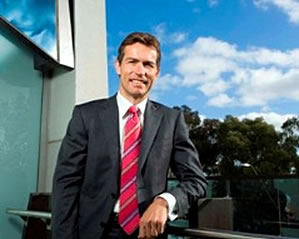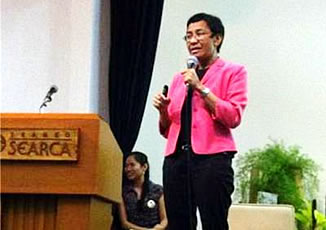- Details
- Category: 2012

Climate change, land degradation, and increasing urbanization all lead to a decline of arable land in Southeast Asia. Consequently, this region is gradually becoming dependent on food imports from developed countries. To prevent a market-driven global food system dominated by the developed countries, promoting food sovereignty is now being endorsed as a social movement in the region.
The Department of Soil Science and Land Resources of the Bogor Agriculture University (IPB) in collaboration with the German Academic Exchange Service (DAAD) held the Regional Workshop "Water, Land and Southeast Asia Food Sovereignty," on 17-21 September 2012 at the IPB International Convention Center. Students and researchers from Vietnam, Thailand, Laos, Philippines, Belgium, China, and Bangladesh, participated in the workshop, which also aimed to build networks between scientists and policy makers on food and agriculture in Southeast Asia.
Prof. Dr. Ir. Herry Suhardiyanto, Rector of IPB, opened the regional meeting, which he said was an avenue for sharing of vital information and research results on water, soil and agricultural productivity among Southeast Asian countries. Dr. Suhardiyanto emphasized the improvement of the irrigation system as a critical component which should be given due attention by all stakeholders, especially the government. As a case in point, Dr. Suhardiyanto shared that in managing its irrigation system, the government of Indonesia has adopted the concept of integrated water resource management, based on economic efficiency, equity, and environment preservation.
Aside from Dr. Suhardiyanto, Dr. R. M. Marty M. Natalegawa, Foreign Minister of the Republic of Indonesia, Dr. Ir. H. Suswono, MMA (Minister of Agriculture of the Republic of Indonesia and Dr. Norbert Baas, German Ambassador in Indonesia graced the regional.
Source: IPB News|20 September 2012
- Details
- Category: 2012

The Senate of the University of Queensland (UQ) has appointed Professor Peter Høj as the next Vice-Chancellor and President of the university. Professor Høj, who is currently the Vice-Chancellor and President of the University of South Australia, is a University of Copenhagen graduate (Master of Science, PhD, and Honorary Doctorate).
In addition to his Australian Academy of Technological Sciences and Engineering Fellowship, Professor Høj was recently appointed as a Foreign Member (Natural Sciences Class) of The Royal Danish Academy of Sciences and Letters.
Since settling in Australia in 1987, Professor Høj has gained national esteem within academic, industry, and government circles. He served as Chief Executive Officer of the Australian Research Council and Managing Director of the Australian Wine Research Institute. Professor Høj’s reputation in the sector is attested to by his membership in several national bodies. He is deputy chair and lead vice chancellor (research) for Universities Australia, the sector’s peak body. He is one of only two Vice-Chancellors on the Australian Quality Framework Council, and was recently appointed to the Board of Commonwealth Scientific and Industrial Research Organisation (CSIRO).
Professor Debbie Terry remains as UQ’s Vice-Chancellor until Professor Høj commences his appointment on 8 October 2012.
- Details
- Category: 2012

"It is no longer a question of professionals versus amateurs; it is a world of collaboration. We have moved from the age of authority to the age of authenticity.” This statement from Maria Ressa, CEO and executive director of the social news network, Rappler, created ripples of excitement among more than 400 students and teachers who packed the SEARCA Umali Auditorium in the UP Los Baños campus on 19 September 2012.
Ressa, former chief of CNN's bureau in Manila and Jakarta and head of ABS-CBN News and Current Affairs, was referring to the power of social media for reportage and social change during her keynote speech in the seminar, entitled, Move Chat Series @ UPLB with the theme “Social Media for Social Change: Pushing Development Forward.”
Rappler, as their online site describes, is “a group of journalists committed to inform Filipinos and inspire them to interact and participate in nation-building by providing a credible, creative, and interactive platform through social media.”
She further explained that the new approach to journalism, which Rappler is advocating, is to be in the center of three overlapping circles, namely: professional journalism, the wisdom of crowds, and rich media.
“You now have to cut across all disciplines of professional journalism. You write, you shoot [pictures], you do the voice, you edit, then you upload,” Ressa said. “Then you have to get the wisdom of the crowds. Seek the opinions and feedback of people; ask them how they feel about issues. That way, we cross out our biases and collectively make better decisions,” she explains.
Rich media, meanwhile, means using technology such as iPhones that enable you to transmit all [information] immediately. “It’s faster than anything!” she enthused. Capturing the best features of these circles are social media.
Building on the keynote message of Maria Ressa are other Rappler team members. Chay Hofileña, citizen journalism director, shared some principles on pushing stories into the mainstream media. “You must tell a story or let it have a human face before going into the statistics; have a narrative such as a triumph, struggle or determination; have a clear voice and direction; and offer a new, different, or fresh perspective to every story,” she advised.
Michael Josh Villanueva, Rappler special projects director, gave useful tips on how to mobilize, build, engage, and act on a development issue using Facebook.
Patricia Evangelista, Rappler multimedia reporter, who describes herself "as more of a story-teller," shared how to tell compelling stories about people who would otherwise not be heard of or known. “People don’t have that imagination to put themselves in others’ shoes…That’s why I write,” she said.
The representative speaker from UPLB was Dr.Serlie Barroga-Jamias, director of the Office of Public Relations (OPR). She related how social media transformed her DevCom 123 students into citizen journalists especially during the crisis of student murders around UPLB last semester.
The seminar was co-organized by the Office of the Chancellor- OPR, the Development Communication Graduate Students Association (DEVCOM-GRADSA), the College of Development Communication (CDC), and the UPLB Foundation Incorporated (UPLB-FI).
Source: Dr. Serlie Jamias from UPLB News|21 September 2012
- Details
- Category: 2012
As the third quarter of 2012 comes to a close, the Southeast Asian University Consortium for Graduate Education in Agriculture and Natural Resources (UC) has awarded more grants to Southeast Asians affiliated with Kasetsart University (KU), Universitas Gadjah Mada (UGM) and University of the Philippines Los Baños (UPLB), conferring more than US$11,000 in grants, as of date.
In particular, Mr Saktyanu Kristyantoadi Dermoredjo (PhD agricultural economics, UGM) and Ms Roxanne Almendral Banalo (MS environmental science, UPLB) have been awarded the UC Student Thesis Grant. On the other hand, Ms Warabhorn Boonyarat (PhD computational chemistry, KU) has been awarded the UC Student Travel Grant for Research which shall provide travel funds to conduct a portion of her dissertation at University of Queensland (UQ) on 1 February-30 June 2013.
Meanwhile, two faculty members from KU and UGM were also awarded the Faculty Travel Grant for Research and Faculty Travel Grant for Conference, respectively. Dr Jureerat Leesmidt, Associate Professor in Microbiology is scheduled to work with Dr Jan Engelstaedter, School of Biological Sciences at UQ on 7-20 April 2013 on “The applications of evolutionary biology between genetic systems and plant-microbe interactions for agricultural benefits.”
Dr Masyhuri, Head of UGM’s Center for World Trade Studies will present his paper “The Impact of Cooperatives Membership on Paddy Farmers’ Welfare in Lampung Province, Indonesia,” at the International Conference on Cooperative Enterprises: Key to Sustainable Economic and Social Progress, organized by UPLB’s College of Economics and Management and to be held at SEARCA, Los Baños, Laguna on November 8-10, 2012.
With the aforementioned awardees, the Consortium has been able to confer a total of 11 of these new grants since January 2012. The 2012 UC Faculty and Student grants aim to expand the academic and research opportunities available to UC faculty members and graduate students. Application requirements and other details about these programs and the Consortium can be found in the UC website at www.uc.searca.org.
Launched in 1989, the University Consortium was initiated by the Southeast Asian Regional Center for Graduate Study and Research in Agriculture (SEARCA) together with five founding members in Southeast Asia as a sustainable strategy to pursue regional agricultural human resource development by linking top agricultural universities in the region to facilitate free exchange of information, facilities, and expertise.
Today, the University Consortium also includes reputable agricultural universities from Canada, Australia, Germany, and Japan as associate members.
- Details
- Category: 2012
The Universiti Putra Malaysia (UPM) will host this year’s Executive Board Meeting of the Southeast Asian University Consortium for Graduate Education in Agriculture and Natural Resources (UC), a consortium of leading agricultural universities in Southeast Asia. Preparations for the meeting are spearheaded by Prof. Dr. Bujang Kim Huat, Dean, School of Graduate Studies and UPM’s Coordinator for UC.
The annual meeting to be held on 19-20 November 2012, is expected to gather the representatives from UPM, Institut Pertanian Bogor (IPB), Kasetsart University (KU), Universitas Gadjah Mada (UGM), University of the Philippines Los Baños (UPLB), Tokyo University of Agriculture (TUA), University of Queensland (UQ), University of British Columbia (UBC), and Georg-August-Universität Göttingen (GAUG).
During the 2-day meeting, the group will once again evaluate the accomplishments of the Consortium for the past year and craft its future directions to help achieve the Consortium’s mission of enhancing graduate education and research in agriculture, environment, and natural resources for the benefit of the Southeast Asian region.
Initiated by the Southeast Asian Regional Center for Graduate Study and Research in Agriculture (SEARCA) in 1989, the UC is a commitment made among leading Southeast Asian higher education institutions to share academic expertise and resources. Today, the University Consortium is an effective network linking strong universities in Southeast Asia, Canada, Australia, Germany, and Japan.


















